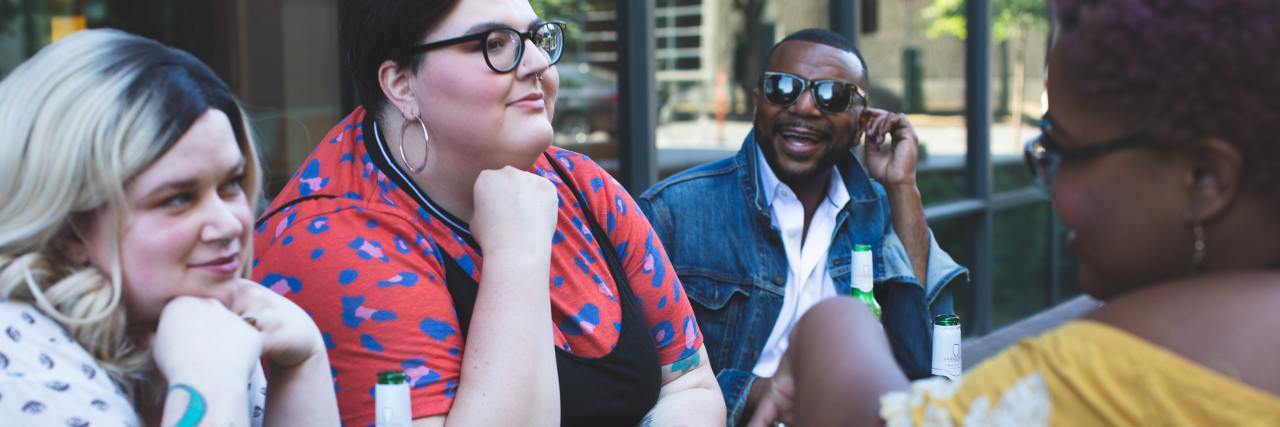We Need to End Fatphobia in Eating Disorder Awareness and Recovery
Editor's Note
If you live with an eating disorder, the following post could be potentially triggering. You can contact the Crisis Text Line by texting “NEDA” to 741741.
“We prescribe to fat people the same things that we diagnose and treat in thin people.”
The first time I heard this statement was from Deb Burgard, PhD, FAED, a psychologist who specializes in eating disorder treatment. As someone who is both fat and has recovered from an eating disorder, it resonated immediately. Even when I was being actively treated for my eating disorder, doctors were suggesting I engage in the exact same behaviors that those treating me were trying to help me stop.
There’s a grave misconception in the medical community that weight-loss behaviors are a path to health for fat people. However, studies have shown that the “Health at Every Size” approach, a weight-neutral approach to health management that challenges the assumption that fat equals unhealthy, achieves health outcomes such as improved blood pressure, eating and activity habits, and self-esteem more successfully than treatments centered around weight loss.
Even though it’s been over a decade since my recovery, I can count on one hand the number of doctors who didn’t encourage me to restrict entire food groups, ignore hunger, fill my stomach with water to avoid eating, account for every morsel of food I ingest, use exercise to negate what I eat, see exercise as a way to earn food and weigh myself frequently even after I had disclosed my eating disorder history.
To be sure, not every diet turns into an eating disorder, but dieting is known to trigger eating disorders. This is a significant issue when you realize that dieting is recommended to a large portion of the population and recommended more aggressively to people in larger bodies. At the same time, thin people are simultaneously told that these behaviors are completely reasonable for those who are (or, perhaps, don’t want to be) fat.
This is, of course, not helped by shows like “The Biggest Loser,” where fat people are physically and emotionally abused and forced into unsafe behaviors that would be massive eating disorder red flags in thinner people. This abomination of a show also highlights another dangerous issue: internalized fatphobia can cause fat people to believe they deserve poor treatment and should risk their lives and quality of lives pursuing thinness.
Once an eating disorder develops, fat people can find it nearly impossible to get appropriate treatment because any honest assessment leads us to an inevitable conclusion — the eating disorder treatment community has a fatphobia and weight stigma problem. We can see it in everything from the research that is pursued to the ways that fat people with eating disorders are treated differently (and dangerously).
A good example of this is the diagnosis of “atypical anorexia.” The only thing “atypical” about it is the fact that the person dealing with it is of “normal” body size or fat. The only thing the diagnosis does is remind us that, historically, fat people have been denied diagnosis and treatment for one of the most deadly mental illnesses because of the fatphobic belief that everyone with anorexia nervosa (or, at least, everyone worth treating) is very thin.
Put it together and you have a culture that is literally doing everything it can to trigger eating disorders in fat patients (and normalize eating disorder behaviors to people of all sizes,) and then refusing to treat the disorders they create, or providing treatment that is incompetent at best.
There is a better way. The National Eating Disorder Association (NEDA) has been doing critical work to shift the culture from a basis in weight stigma to one firmly rooted in respect for size diversity and based on a “Health at Every Size” perspective, including with this year’s National Eating Disorders Awareness Week theme “Come as You Are: Hindsight is 2020.”
It’s time for the eating disorders treatment community to own up to the mistakes that have been made and help people who have been harmed. Eating disorder work has historically been focused on those who are thin, white, young, cisgender and currently able-bodied, which means far too many people who are already part of marginalized communities have, and continue to be, left behind. Fixing that swiftly by centering the voices of, and working with, those who have been traditionally oppressed is necessary, and I’m grateful for the work NEDA is doing in that regard.
Hindsight makes it clear that moving from diet culture (which is, all too often, trying to rebrand itself as “wellness culture”) to a celebration of size diversity and the “Health at Every Size” paradigm is one of the ways we can prevent eating disorders and allow for full recovery. If you’re also interested in expanding the perception of what eating disorders look like and educating the medical field on safer practices, I encourage you to make your voices heard this NEDAwareness Week.
Photo by AllGo – An App For Plus Size People on Unsplash

